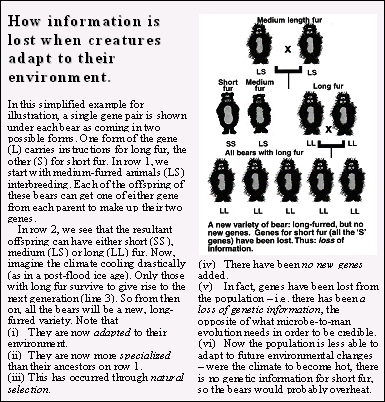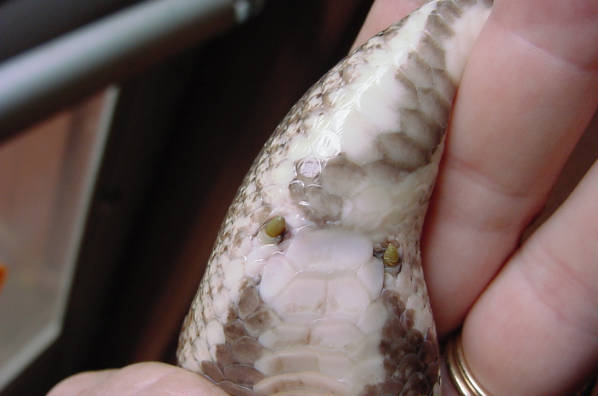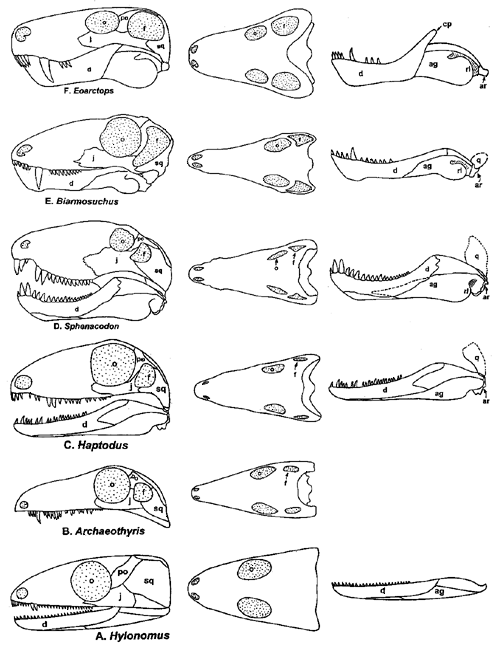Evointrinsic
Member
- May 23, 2009
- 529
- 0
Hello everybody! This topic is dedicated to understanding of Evolution. I've been on the forums for about a year now, and nearly every single day i've been active on the forum, there has been a misconception about the Theory of Evolution (TE). With this topic I hope to openly discuss the issues you may have with the TE, and present information in an easy to understand, and easy to find, manner  I may not be able to answer every single question you may have, I am not an expert, but I am well versed on the subject, so I can do my best.
I may not be able to answer every single question you may have, I am not an expert, but I am well versed on the subject, so I can do my best.
Before I start throwing paragraphs everywhere, I'll be explaining a few certain things that aren't specifically the TE, but do relate. I'll also be color coding paragraphs so you can help navigate through the topic if there is something you'd like more information on than another.
Science in general: DARK BLUE (first post)
Evolution, specifically: DARK RED (second post)
I had to change this to two posts for the length. heads up!
What is science?
You'd think I wouldn't have to talk about this, but there are people on this forum that just don't seem to fully grasp what Science and Scientists do. All science is, is the attempt to describe what is happening in a certain phenomenon. An example of this would be Gravity. We have a theory of Gravity that is the attempt to explain how gravity works. We do know that Gravity exists, and using our explanation of Gravity we can calculate the strength of gravity using mathematics as well as other scientific studies to determine the strength of gravity a specific object processes. It is unusual for a field of study to only use the field that they are studying in. Take evolution for our next example:
As you can see, there's a lot of information that is integrated and used in a single scientific theory. This applies to all scientific theories, although with a different accumulation of other scientific fields, that help scientists aid in a more unified and accurate description of whatever that specific scientific theory is describing.
Scientists are devious and try to hide their false information by presenting it as true!
This accusation seems to appear more often than not by members of the forum as well as outside it. This is quite fortunately the opposite, however. No matter what scientific field a scientist is working in, they make all information available for other scientists, as well as the public, to analyze and fine-tune. By fine-tune I mean debate. Because Science is merely the act of describing a phenomenon, the more a hypothesis or theory is challenged, such as when another scientists presents information that counters the claims a hypothesis or theory states. There is no such thing as a hypothesis, theory or law that cannot be challenged, and for that matter, hasn't been.
All Science requires evidence!
Correct! To have a scientific theory or hypothesis, it must first accumulate and discover evidence. Because Science is a description of a phenomenon, evidence must parallel the description in order for that description to be at all accurate. This being the case, there cannot be any guesses that act as evidence in the theory or hypothesis to finalize either or. There can, however, be more evidence in one theory than the other. The theory or hypothesis with the most evidence is thus more factual than it's previous description.
This, however, makes a lot of people untrustworthy of Science. Because science is always changing. "how can I believe in one thing one day, and the opposite the next?" Well, scientists all realize that this is the case, there for the theories and hypothesis' themselves are never 100% Final. Regardless if its a hypothesis, theory or law.
What's the difference between a scientific theory and a scientific law?
A scientific theory is meant to explain a group of related events and observations based on proven hypotheses and confirmed by numerous researchers that work in separate fields.
A scientific law is meant to explain an action or a set of action. Using mathematics, we can explain what can occur in a given situation that this law applies to. The law is generally accepted to be true and universal.
I've heard stories of scientists that tried to cover something up and present it as truth!
Yes, and we all have. Take a look at who is accusing these things though. I dont mean to be insulting, but it usually is a fundamental religious person. The accusations usually are just accusations and don't have any evidence to support the claims. Or, the evidence that is given is falsified. I have looked in many cases of these on both sides of the argument, and the same outcome seems to happen.
Scientists think they know everything!
Absolutely not! We may see TV shows that depict a scientist who can figure out any situation, but that's not the case in real life. Scientists work specifically in one field of study, some times two or three, but there is no scientist that works like the ones depicted on television in that way. It is much more efficient to be a master at one, than know a little about everything. Much more can be discovered if we have numerous "master of ones" that can show their information to other scientists to aid in their studies, or falsify their studies.
There were a bunch of scientists that signed a petition that said they didn't believe in evolution!
This is very true! And this happens in all sorts of theories. It doesn't however disprove the theory wrong. And keep in mind, from what we learned before, the theory may be proven wrong, but it's only describing a phenomenon.
But let's take a look at the petition that these scientists signed...
This is the statement they signed:
"We are skeptical of claims for the ability of random mutation and natural selection to account for the complexity of life. Careful examination of the evidence for Darwinian theory should be encouraged. "
Now, this doesn't specifically say that they do not agree that the Theory of Evolution is all that factual, but that they are skeptical of the claims and that more research should be encouraged. In fact, I partially agree to that statement! Over examination is crucial in science, not a bad thing. This is how science works. Not only that, but a claim of skepticism is pretty much worthless without any evidence to back it up. Lastly, the majority of the signatures that are in the list are not biologists (about 80%), some aren't even scientists.
Here is a quote from this video http://www.youtube.com/watch?v=Ty1Bo6GmPqM that talks more about the matter
Now that we know all about how science works, let's move on to the actual subject!
 I may not be able to answer every single question you may have, I am not an expert, but I am well versed on the subject, so I can do my best.
I may not be able to answer every single question you may have, I am not an expert, but I am well versed on the subject, so I can do my best.Before I start throwing paragraphs everywhere, I'll be explaining a few certain things that aren't specifically the TE, but do relate. I'll also be color coding paragraphs so you can help navigate through the topic if there is something you'd like more information on than another.
Science in general: DARK BLUE (first post)
Evolution, specifically: DARK RED (second post)
I had to change this to two posts for the length. heads up!
What is science?
You'd think I wouldn't have to talk about this, but there are people on this forum that just don't seem to fully grasp what Science and Scientists do. All science is, is the attempt to describe what is happening in a certain phenomenon. An example of this would be Gravity. We have a theory of Gravity that is the attempt to explain how gravity works. We do know that Gravity exists, and using our explanation of Gravity we can calculate the strength of gravity using mathematics as well as other scientific studies to determine the strength of gravity a specific object processes. It is unusual for a field of study to only use the field that they are studying in. Take evolution for our next example:
This quote given from: http://www.youtube.com/watch?v=KnJX68ELbAYAronRa said:To adequately understand evolution, you not only have to understand how to be scientific, (which is the real trick for most people) but you also have to know something about cellular biology, genetics, and anatomy, geology, particularly paleontology, as well as environmental systems, tectonics, atomic chemistry, and especially taxonomy, which most people don’t know squat about at all. Most people who accept evolution also tend to know a whole lot about cosmology, geography, history, sociology, politics, and of course, religion.
As you can see, there's a lot of information that is integrated and used in a single scientific theory. This applies to all scientific theories, although with a different accumulation of other scientific fields, that help scientists aid in a more unified and accurate description of whatever that specific scientific theory is describing.
Scientists are devious and try to hide their false information by presenting it as true!
This accusation seems to appear more often than not by members of the forum as well as outside it. This is quite fortunately the opposite, however. No matter what scientific field a scientist is working in, they make all information available for other scientists, as well as the public, to analyze and fine-tune. By fine-tune I mean debate. Because Science is merely the act of describing a phenomenon, the more a hypothesis or theory is challenged, such as when another scientists presents information that counters the claims a hypothesis or theory states. There is no such thing as a hypothesis, theory or law that cannot be challenged, and for that matter, hasn't been.
All Science requires evidence!
Correct! To have a scientific theory or hypothesis, it must first accumulate and discover evidence. Because Science is a description of a phenomenon, evidence must parallel the description in order for that description to be at all accurate. This being the case, there cannot be any guesses that act as evidence in the theory or hypothesis to finalize either or. There can, however, be more evidence in one theory than the other. The theory or hypothesis with the most evidence is thus more factual than it's previous description.
This, however, makes a lot of people untrustworthy of Science. Because science is always changing. "how can I believe in one thing one day, and the opposite the next?" Well, scientists all realize that this is the case, there for the theories and hypothesis' themselves are never 100% Final. Regardless if its a hypothesis, theory or law.
What's the difference between a scientific theory and a scientific law?
A scientific theory is meant to explain a group of related events and observations based on proven hypotheses and confirmed by numerous researchers that work in separate fields.
A scientific law is meant to explain an action or a set of action. Using mathematics, we can explain what can occur in a given situation that this law applies to. The law is generally accepted to be true and universal.
I've heard stories of scientists that tried to cover something up and present it as truth!
Yes, and we all have. Take a look at who is accusing these things though. I dont mean to be insulting, but it usually is a fundamental religious person. The accusations usually are just accusations and don't have any evidence to support the claims. Or, the evidence that is given is falsified. I have looked in many cases of these on both sides of the argument, and the same outcome seems to happen.
Scientists think they know everything!
Absolutely not! We may see TV shows that depict a scientist who can figure out any situation, but that's not the case in real life. Scientists work specifically in one field of study, some times two or three, but there is no scientist that works like the ones depicted on television in that way. It is much more efficient to be a master at one, than know a little about everything. Much more can be discovered if we have numerous "master of ones" that can show their information to other scientists to aid in their studies, or falsify their studies.
There were a bunch of scientists that signed a petition that said they didn't believe in evolution!
This is very true! And this happens in all sorts of theories. It doesn't however disprove the theory wrong. And keep in mind, from what we learned before, the theory may be proven wrong, but it's only describing a phenomenon.
But let's take a look at the petition that these scientists signed...
This is the statement they signed:
"We are skeptical of claims for the ability of random mutation and natural selection to account for the complexity of life. Careful examination of the evidence for Darwinian theory should be encouraged. "
Now, this doesn't specifically say that they do not agree that the Theory of Evolution is all that factual, but that they are skeptical of the claims and that more research should be encouraged. In fact, I partially agree to that statement! Over examination is crucial in science, not a bad thing. This is how science works. Not only that, but a claim of skepticism is pretty much worthless without any evidence to back it up. Lastly, the majority of the signatures that are in the list are not biologists (about 80%), some aren't even scientists.
Here is a quote from this video http://www.youtube.com/watch?v=Ty1Bo6GmPqM that talks more about the matter
DonExodus2 said:We have all seen the Discovery Institutes list of scientists rejecting evolution. I analyzed the list, and emailed its signees. The truth of the matter is, DI lied repeatedly when constructing the list, and, by their own admission, even IF the numbers are skewed hugely in favor or the creationists, this still leaves .0027% of scientists in the US rejecting evolution.
DonExodus2 said:There is a gentlemen that signed and he is a Park Ranger, which supposedly count's as a scientists. There are people on the list that work for Law schools, mathematics. The majority are computer science engineers.
Now that we know all about how science works, let's move on to the actual subject!
























